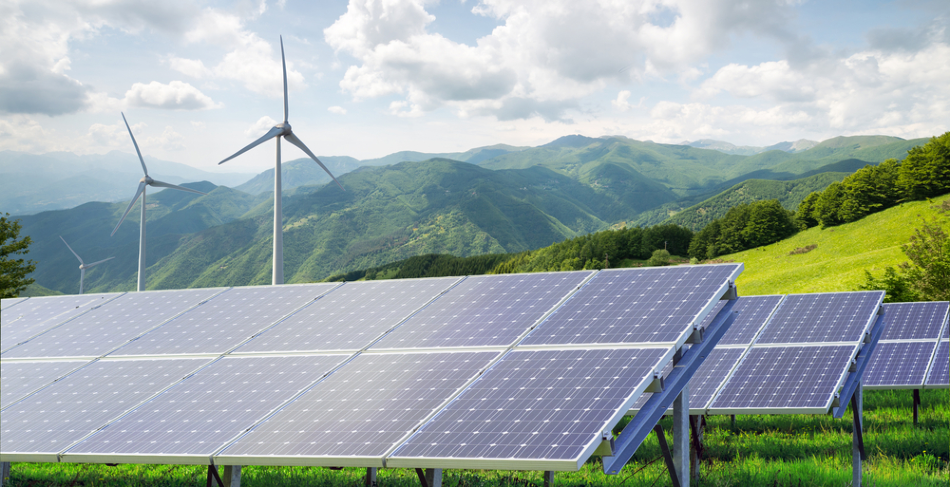Aug 7 2020
A new study by researchers at Caltech reports that long-term energy storage could have a crucial role in ensuring reliability and decreasing electricity costs, with more US states pushing for a higher reliance on variable renewable energy, such as wind or solar power.

Image Credit: geniusksy/Shutterstock.com
Jackie Dowling, a graduate student working in the lab of Nathan Lewis (BS ’77), the George L. Argyros Professor and professor of chemistry, has teamed up with Ken Caldeira from the Carnegie Institution for Science and others to explore energy-storage options and several decades of data related to wind and solar availability.
Dowling and her colleagues found that existing battery technology incurs exorbitant costs for long-term energy storage services for the power grid. They also determined that alternative technologies for storing energy worth a few weeks up to a month for whole seasons or even several years could be crucial in setting up cost-effective, reliable renewable electricity systems.
In the case of renewable energy, energy storage is highly essential as solar and wind energy are not constantly available as fossil fuels. For instance, in the United States, wind power is usually at its lowest during the summer. During this time the electrical grid experiences considerable strain due to the demand for air conditioning in homes and businesses.
This research is motivated by the fact that laws in several states have mandated 100 percent carbon-free electricity systems by midcentury. Within these mandates, a lot of states include requirements for wind and solar power. Both wind and solar are variable from day to day, or even year to year, yet high reliability is mandatory for a viable electricity system. Energy storage can fill in for the gaps between supply and demand.
Jackie Dowling, Study Lead Author and Graduate Student, Caltech
Dowling analyzed short-duration storage systems like lithium-ion batteries, as well as long-duration storage techniques, such as pumped-storage hydroelectricity, compressed-air storage, and hydrogen storage.
With the aim of assessing how to improve the use of such storage technologies at the lowest energy cost, Dowling developed a mathematical simulation of each technology and integrated historical electricity-demand data and 40 years of hourly resolved historical weather data over the contiguous United States.
Dubbed by her as the Macro Energy Model, it demonstrates that the addition of long-duration storage to a wind–solar-battery system reduces the energy costs. On the other hand, the use of only batteries for storage renders renewable energy highly expensive.
According to Dowling, the additional cost associated with batteries emerges as they cannot affordably store energy sufficient for a whole season during which lower amounts of electricity is produced.
This implies that an electrical grid would need several expensive solar panels or wind turbines to compensate and would lead to wasteful idling of electricity-production equipment for a major part of the year.
Dowling added that existing battery technology is not close to being affordable for seasonal storage.
“The huge dip in wind power in the summer in the U.S. is problematic, and batteries are not suitable for filling that gap. So, if you only have batteries, you have to overbuild wind or solar capacity,” she added.
Long-duration storage helps avoid the need to overbuild power generation infrastructure and provides electricity when people need it rather than only when nature provides it. At current technology costs, storage in underground caverns of green hydrogen generated by water electrolysis would provide a cost-effective approach for long-duration grid storage.
Jackie Dowling, Study Lead Author and Graduate Student, Caltech
Although other research teams have developed renewable energy models, the data-driven approach by the Caltech team is the first to include four decades of historical solar and wind variability data, considering variability from year to year and periodic episodes of rare weather events that impact power generation, for example, solar and wind droughts.
The more years of data we use in our models, the more we find a compelling need for long-term storage to get the reliability that we expect from an electricity system.
Jackie Dowling, Study Lead Author and Graduate Student, Caltech
Dowling states the study findings could be useful for policymakers in states that implement 100% carbon-free electricity laws and high solar/wind mandates and to other U.S. states factoring the adoption of similar laws.
Next, she intends to widen her study to analyze in-depth the roles that could be played by particular types of energy storage, like hydrogen or redox flow batteries, in renewable energy systems. For example, certain types of batteries might be effective as medium-duration energy storage, Dowling added.
The study titled “Role of long-duration energy storage in variable renewable electricity systems” will appear in the September issue of Joule. The co-authors of the study are Lewis and Katherine Rinaldi, chemistry graduate student, from Caltech; Tyler Ruggles, Mengyao Yuan, and Ken Caldeira from the Carnegie Institution for Science; Steven Davis from UC Irvine; and Fan Tong from the Carnegie Institution for Science and Lawrence Berkeley National Laboratory.
The study was financially supported by the Resnick Sustainability Institute at Caltech, through which Dowling is a Zeller-Resnick Fellow; the Gordon and Betty Moore Foundation; a fellowship from the Southern California Gas Company; and through a gift from Gates Ventures LLC to the Carnegie Institution for Science.